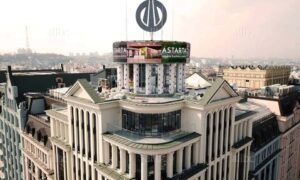
Agroholding Astarta, the largest sugar producer in Ukraine, is investing $14.6 million in the construction of a bulk sugar storage facility on the territory of its Narkevychi sugar plant (Narkevychi, Khmelnytsky region) with a total storage capacity of 60,000 tonnes.
The decision of the board of directors of the group was published on the Warsaw Stock Exchange (WSE) on Tuesday evening.
The commissioning of the facility is scheduled for July 2023.
“Unique for Ukraine, technological solutions under the project will create optimal conditions for long-term storage of sugar and preservation of its original quality. Such warehouse will also allow optimising logistics costs, maintaining the high quality of the company’s products and selling it in alternative packaging,” Astarta said in the statement.
As reported, Astarta planned to build and put into operation this facility back in 2020.
The agricultural holding acquired the Narkevychi sugar plant in 2008.
Astarta is a vertically integrated agro-industrial holding operating in eight regions of Ukraine.

Italy plans to allocate EUR 110 million in financial assistance to support the population and economy of Ukraine in areas that will be agreed with the Ukrainian authorities, Italian Minister of Foreign Affairs and International Cooperation Luigi Di Maio said during a briefing in the Senate of the Italian Parliament.
“We also intend to help the International Committee of the Red Cross in the humanitarian sphere,” he added, commenting on the results of his visit to Kyiv last week.
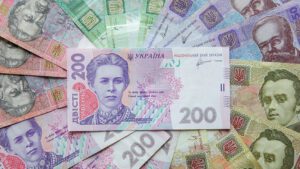
The hryvnia exchange rate, when plans to introduce a state of emergency were announced, fell below the level of UAH 29.5/$1 on the interbank market on Wednesday afternoon.
As one of the market participants told Interfax-Ukraine, in the first half of the day, thanks to the efforts of the National Bank, it was kept at the level of UAH 29.3-29.35/$1 compared to UAH 29.05/$1 at the end of the day on Tuesday, however, some transactions have now appeared much cheaper than UAH 29.5/$1.
The weakening of the hryvnia is also taking place in the cash market, where since the beginning of the day the bid quotes have risen from about UAH 29/$1 to UAH 29.2/$1, while the selling rate has risen from UAH 29.3/$1 to UAH 29.7/$1.
In the cash market among individuals, according to the finance.ua resource, the hryvnia exchange rate has already fallen to UAH 30/$1.
As reported, last week, after two weeks of net redemption of foreign currency, the NBU again returned to its net sale to support the hryvnia: the sale amounted to $503 million, the purchase – $50 million, although since the beginning of the year the National Bank has sold $2.064 billion and bought – $0.657 billion.
However, another aggravation on the part of Russia and its recognition of the so-called “L/DPR” with the next territorial claims this week led to the weakening of the hryvnia by almost 4%, and the need for the National Bank to again enter the market with interventions to support the hryvnia. Its additional interventions are estimated at over $400 million.
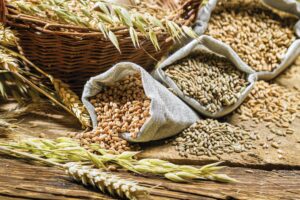
In 2021, Ukraine harvested 85.7 million tonnes of grain and leguminous crops, which is 32% higher than in 2020, including 32.07 million tonnes of wheat (28.9% more), 41.87 million tonnes of corn (38.2% more) and 9.42 million tonnes of barley (23.3% more). Such final data on harvest volumes for the last year are published on the website of the State Statistics Service of Ukraine. In addition, 593,900 tonnes of rye were harvested in Ukraine (30% more compared with 2020), 471,000 tonnes of oats (7.3% less), 204,200 tonnes of millet (20.2% less), 173,900 tonnes of sorghum (63.2% more), 106,000 tonnes of buckwheat (8.5% more), 48,600 tonnes of rice (20% less), 32,300 tonnes of triticale (7.8% less), as well as 681,000 tonnes of leguminous crops.
Among other agricultural crops in the country last year, 16.38 million tonnes of sunflower were harvested (25% more compared to 2020), 10.8 million tonnes of sugar beet (18.1% more), 3.5 million tonnes of soybeans (24.4% more), 2.92 million tonnes of rapeseed and 42,000 tonnes of oilseed flax (an increase of 3.7 times).
In terms of fruit and vegetable crops, Ukraine in 2021 harvested 21.35 million tonnes of potatoes (2.5% more compared to 2020), 9.93 million tonnes of vegetables (2.9% more), 6.8 million tonnes of fodder corn (3.0% more), 5.17 million tonnes of fodder beet (6% less), 2.24 million tonnes of fruit and berry crops (10.7% more) and 0.26 million tonnes of grapes (8.3% less).
Most of all last year, the area under fodder corn decreased by 19.1% compared to 2020, to 216,400 hectares, rice – by 12.0%, to 10,000 hectares, sorghum – by 11.9%, to 41,600 hectares, while the largest increase in areas was recorded under oil flax (growth by 1.95 times), to 27,400 hectares, rye – by a quarter, to 172,900 hectares and buckwheat – by 9%, to 92,000 hectares.
The yield of the vast majority of agricultural crops improved last year. In particular, the yield of wheat was 4.53 tonnes per ha (19% more compared with 2020), corn – 7.67 tonnes per ha (36.5% more), barley – 3.82 tonnes per ha (18.6% more), rye and triticale – 3.44 tonnes per ha (3.6% and 2.1% more respectively), oats – 2.63 tonnes per ha (2.7% more), sorghum – 4.16 tonnes per ha / ha (86% more), millet – 2.35 tonnes per ha (46% more), other legumes – 2.19 tonnes per ha (13.5% more).
Also, the yield of sugar beet was 47.76 tonnes per ha (15% more compared with 2020), fodder corn – 31.5 tonnes per ha (27% more), fodder beet – 29.44 tonnes per ha (2% more), vegetable crops – 21.54 tonnes per ha (4% more), potatoes – 16.64 tonnes per ha (6% more), fruit and berry crops – 11.86 tonnes per ha (12% more), grapes – 7.58 tonnes per ha (0.3% more), rapeseed – 2.92 tonnes per ha (27.0% more), soybeans – 2.64 tonnes per ha (+29% more), sunflower – 2.46 tonnes per ha (22% more), oil flax – 1.55 tonnes per ha (39% more).
At the same time, the yield of rice decreased to 4.91 tonnes per ha (8.1% less) and buckwheat – to 1.15 tonnes per ha (0.9% less).
Thus, the total harvest of all indicated agricultural crops in Ukraine last year amounted to 165.1 million tonnes, while the harvest of grain, leguminous and oilseeds indicated by the State Statistics Service was 108.5 million tonnes.
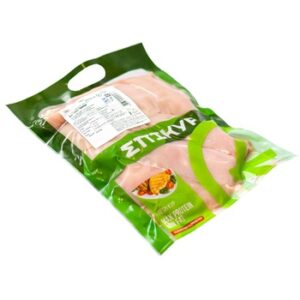
Oleksiy Kovalenko, co-owner of PJSC Volodymyr-Volynska Poultry Farm (Volyn region), has canceled the license for the production of chicken at this enterprise under the Epikur brand due to disagreements with another co-owner of the company, Mykhailo Dobkin.
“I am withdrawing my Epikur from shelves. Otherwise, your money will increase the threat of war for you! The question is in Mykhailo Dobkin, who recently became a shareholder of the Volodymyr-Volynska poultry farm. Before he appeared I established the production of chicken without antibiotics and any rubbish under TM Epikur under my license and with my “epi-team,” Kovalenko wrote on Facebook.
Earlier, in an interview with Forbes, he said that the brothers Mykhailo and Dmytro Dobkin inherited 33% each in the charter capital of the company after the death of their father Mark Dobkin, after which the shareholders had divided views on doing business. He said that as of the beginning of February of this year, Kovalenko and his family owned 34% of the company’s shares, while Dobkins owned 66%.
“From recent publications and appeals from investigative journalists, I know that Dobkin is no longer just about toxic rhetoric, but about criminal cooperation with the “LPR”/Russia. Not words, but deeds. So cynical in relation to Ukraine that I immediately put an end to Volodymyr-Volynska poultry farm regarding Epikur. At the same factory, Dobkin produces the usual brand – Chebaturochka. I do not influence him, here everyone can vote with their wallet,” Kovalenko said.
He said that the production of chicken meat under the Epikur brand at the poultry farm was stopped.
“With the appearance of Dobkin among the shareholders, I began to take steps not to deal with him. It was supposed to introduce Epikur technologies in other industries and transfer production and supplies. So I’m acting in this way… but I can’t wait in such a situation,” he wrote.
In addition, Kovalenko promised to take factory employees into his team, who will decide to quit or be fired by its management.
Blogger Miroslav Gai wrote on Facebook early February of this year that Mykhailo Dobkin supplies chicken to the territory of the self-proclaimed “LPR” and “DPR.”
“The former mayor takes the finances for his own information campaign from the Volodymyr-Volynska Poultry Farm, which is controlled by the prosecutor’s office. It is the one that the prosecutor’s office suspects of illegally receiving UAH 34 million in budget support. It is the one that transferred poultry for millions of U.S. dollars to the eponymous firm (Volodymyr-Volynska Trade Company) from Kharkiv, which is headed by the way, by a resident of the so-called “LPR,” the blogger wrote on the social network.
PrJSC Volodymyr-Volynska Poultry Farm is a Ukrainian-Dutch enterprise, one of the five largest producers of chicken meat in Ukraine, occupying about 6% of the market.
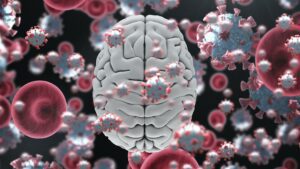
Ukraine has recorded 25,062 COVID-19 cases, 37,432 recoveries and 297 fatalities in the past 24-hour period, the Ukrainian Health Ministry said on Wednesday.
“Ukraine saw 25,062 new confirmed cases of the coronavirus disease COVID-19 in a 24-hour period on February 22. New cases included 2,427 children and 665 medical workers. As many as 62,935 people have been inoculated against COVID-19. Of them, 16,844 received the first dose of a two-shot vaccine, and 27,071 the second one in this 24-hour period. As many as 598 people were given an additional dose, and 18,422 a booster dose. As many as 3,140 people have been admitted to hospitals, 297 patients have died, and 37,432 have recovered over the past 24 hours,” the Health Ministry’s press service said in the morning bulletin on Telegram.
Cumulatively, Ukraine has recorded 4,783,835 cases of COVID-19. The cumulative number of recoveries was at 4,023,033 as of Wednesday. The country’s COVID-19 death toll has climbed to 105,229.
Since the vaccination campaign began, 15,712,650 people have been inoculated in Ukraine. Of them, 15,175,097 have received two doses of a two-shot vaccine. As many as 27,458 people have been given an additional dose and 701,836 a booster dose, according to the Ukrainian Health Ministry.